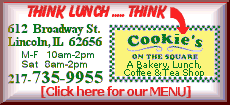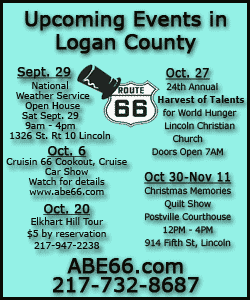|
 FDA
Officials: Cold Meds Not for Kids FDA
Officials: Cold Meds Not for Kids
 Send a link to a friend
Send a link to a friend
[September 29, 2007]
WASHINGTON (AP)
-- Very young children simply should not take some commonly used cold and cough medicines, federal health officials say in recommending that the "consult your physician" advice to parents on the labels be dropped.
|
|
The preliminary recommendation, from Food and Drug Administration safety officials, would apply to decongestant use in children under 2, and antihistamines in those younger than 6, according to agency documents released Friday.
The more than 350 pages of documents are part of a broad and ongoing FDA examination of whether the roughly 800 medicines, many popular and widely used, are safe and effective in treating children's colds and coughs.
FDA advisers are to take up the issue during an Oct. 18-19 meeting. The FDA has not made a final decision on any label changes. Action is likely, pending a recommendation from outside experts.
The review came in response to a recently filed petition by Baltimore city officials, who charged that many over-the-counter cough and cold remedies can harm toddlers and preschoolers. Those officials, joined by the American Academy of Pediatrics, cite evidence that suggests the drugs are not only risky but also don't work in the very young.

"The basic question is, why should a product be so relentlessly marketed when it's not safe or effective?" said Dr. Joshua Sharfstein, Baltimore's health commissioner. "It does not make sense, in the absence of information, to say 'consult a physician,' because they do not have superhuman powers. They cannot make a product safe or effective."
The Consumer Healthcare Products Association, which represents makers of over-the-counter medicines, backs the recommendation that the cold and cough treatments not be used in children younger than 2. Separately, for antihistamines, the group recommends adding a warning that the drugs not be used to sedate young children, president Linda Suydam said.
[to top of second column]

 |

An FDA review of side-effect records filed with the agency between 1969 and September 2006, found 54 reports of deaths in children associated with decongestant medicines made with pseudoephedrine, phenylephrine or ephedrine. It also found 69 reports of deaths associated with antihistamine medicines containing diphenhydramine, brompheniramine or chlorpheniramine.
Most of the deaths were children younger than 2.
The Baltimore petition came on the heels of a Centers for Disease Control and Prevention report that found more than 1,500 toddlers and babies wound up in emergency rooms over a two-year period because of the drugs.
Also on Friday, the FDA gave drug companies until Oct. 31 to stop making and selling any unapproved prescription medicines labeled for use by children younger than 6 that contain the painkiller and cough suppressant hydrocodone.
The move is part of a broader effort to remove from sale an estimated 200 unapproved prescription cough medicines made with the narcotic.

Manufacturers of any other unapproved hydrocodone medicines, beyond those intended for young children, must stop making them by Dec. 31 and cease shipping them by March 31, 2008, the FDA said. It said the order applies to most of the hydrocodone formulations sold as cough medicines.
The order does not apply to other hydrocodone formulations, including the seven cough suppressants made with the narcotic that do have FDA approval. Nor does it apply to pain-relief drugs like Vicodin, which combine hydrocodone and acetaminophen.
[Associated Press;
By ANDREW BRIDGES]
Copyright 2007 The Associated Press. All rights reserved.
This material may not be published, broadcast, rewritten or
redistributed. |